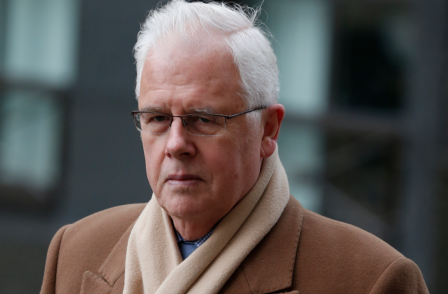
The Sun’s chief reporter cultivated a confidential source at the Ministry of Defence because “paranoia” and fear of “embarrassment” was getting in the way of stories in the public interest coming out, a court heard.
John Kay, 71, (pictured: Reuters) is on trial accused over his contact with MoD official Bettina Jordan-Barber who was paid £100,000 for information leading to the publication of 69 stories over a period of eight years.
Giving evidence in his defence at the Old Bailey, Kay told jurors that he made it clear to Jordan-Barber from the outset that he was not interested in “tittle tattle” but the paper would pay for serious news such as equipment shortages, bullying and sex scandals.
[Update 10 May 2021: Swashbuckling Sun chief reporter John Kay who revealed leaked Queen’s Christmas message dies aged 77]
He promised she would be a protected source and her name would never be revealed to anyone – something he considered to be the “number one rule” in journalism.
Kay first met Jordan-Barber for lunch in 2003 after she rang the newspaper to check whether it was running a story about an affair between officers.
Recalling their first meeting, he said: “I made the point we were prepared to pay for information but we were not interested in tittle tattle. The Ministry of Defence were a very secretive department which would sit on various stories which it would find embarrassing.”
He said Jordan-Barber agreed they were secretive, and added: “I think it is a case of paranoia, the thought of seeing bad stories in the media – things like equipment shortages, bullying, security issues, sex scandals and the like.
“The gist of what I said was we would be interested in stories – serious stories – that the MoD was sitting on and I could arrange a secure payment through Thomas Cook which would enable for her to be paid a fee in cash and not go through the normal contributor system.”
Defence lawyer Trevor Burke QC asked: “Did you explain to her what you perceived your duty to be?”
The defendant replied: “I said she would have total protection and her name would never be disclosed by us and I would go to great lengths to ensure her name was not discussed in the office.”
He went on to say that of the information Jordan-Barber provided him with over the years, some 60 per cent led to a published story and it all proved to be “remarkably accurate”.
In 2011 when the Operation Elveden investigation started into The Sun and News International, Kay phoned Jordan-Barber to warn her.
He said she was his primary concern and he repeated his reassurance that her name was “safe” and would never be disclosed, as he was completely unaware that was what NI was preparing to do at the time.
Kay told the court that throughout his 50 years as a working journalist he was not aware of legal issues around public officials and he had no idea that Jordan-Barber might be described as such.
Asked if he ever treated her differently from other sources, he said: “I treated her with extreme special care because, knowing she was employed by the MoD, what she was doing could get her in trouble with her employers. If her employers knew she was being paid by us, she would inevitably be sacked.
“My primary duty to her was to maintain discretion at all times to avoid her name ever coming out. It is the number one rule of journalism to protect your sources.”
The court heard that award-winning journalist Kay began his career in newspapers on the Newcastle Journal before moving to The Sun in 1973. In 2011, he relinquished his chief reporter title to work part-time and has been suspended on full pay since his arrest in 2012.
Kay is in the dock alongside royal editor Duncan Larcombe, executive editor Fergus Shanahan, deputy editor Geoffrey Webster, former colour sergeant at Sandhurst John Hardy and his wife Claire.
Kay is charged along with Shanahan and Webster with conspiring with each other and Jordan-Barber to commit misconduct in a public office between 1 January 2004 and 31 January 2012.
Kay, 71, of Golders Green, north London; Larcombe, 39, of Aylesford, Kent; Webster, 55, of Goudhurst, Kent; Shanahan, 59, of Felsted, Essex; and John Hardy, 44, and Claire Hardy, 41, of Accrington, Lancashire, all deny the charges against them.
Email pged@pressgazette.co.uk to point out mistakes, provide story tips or send in a letter for publication on our "Letters Page" blog
